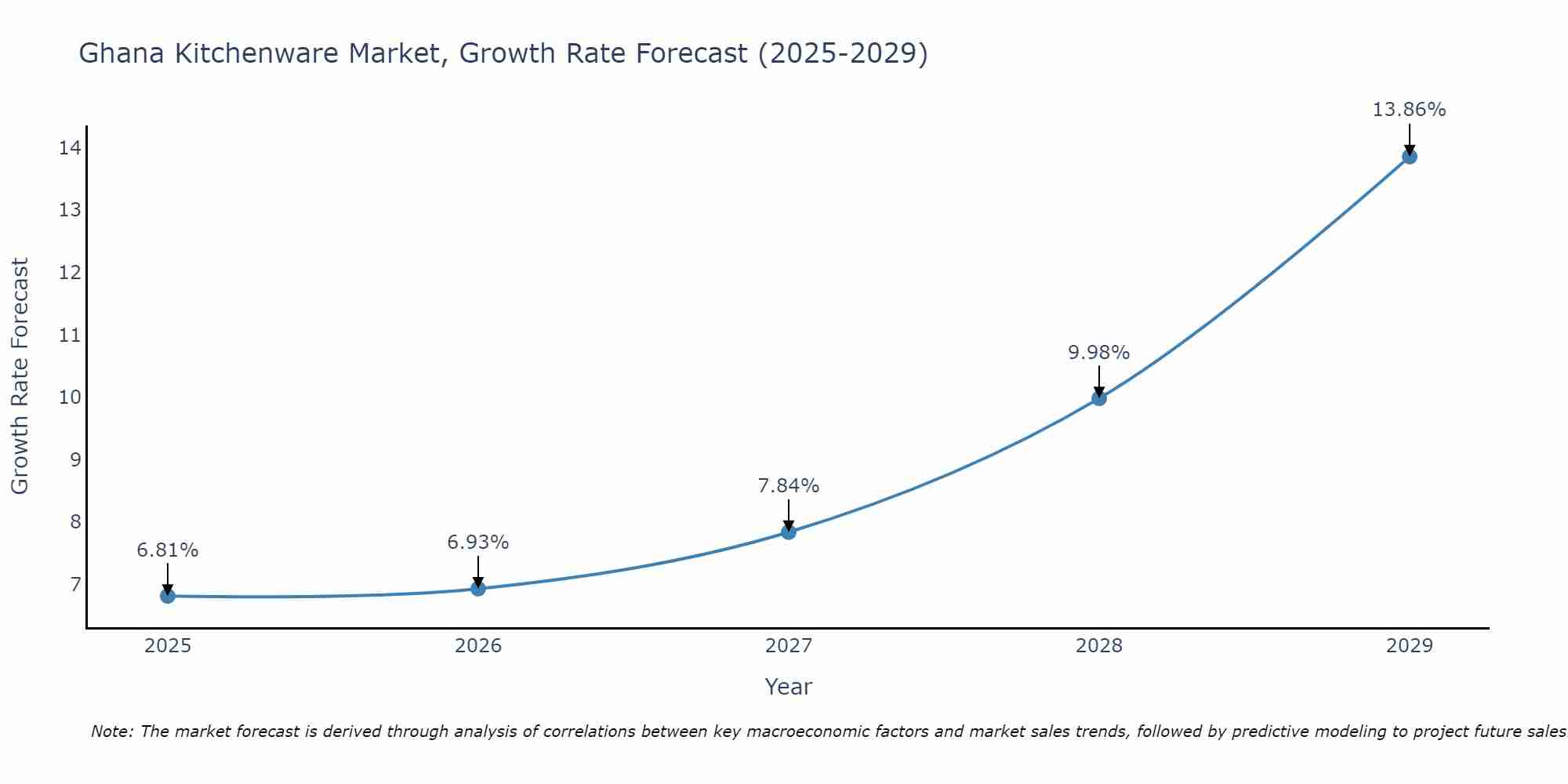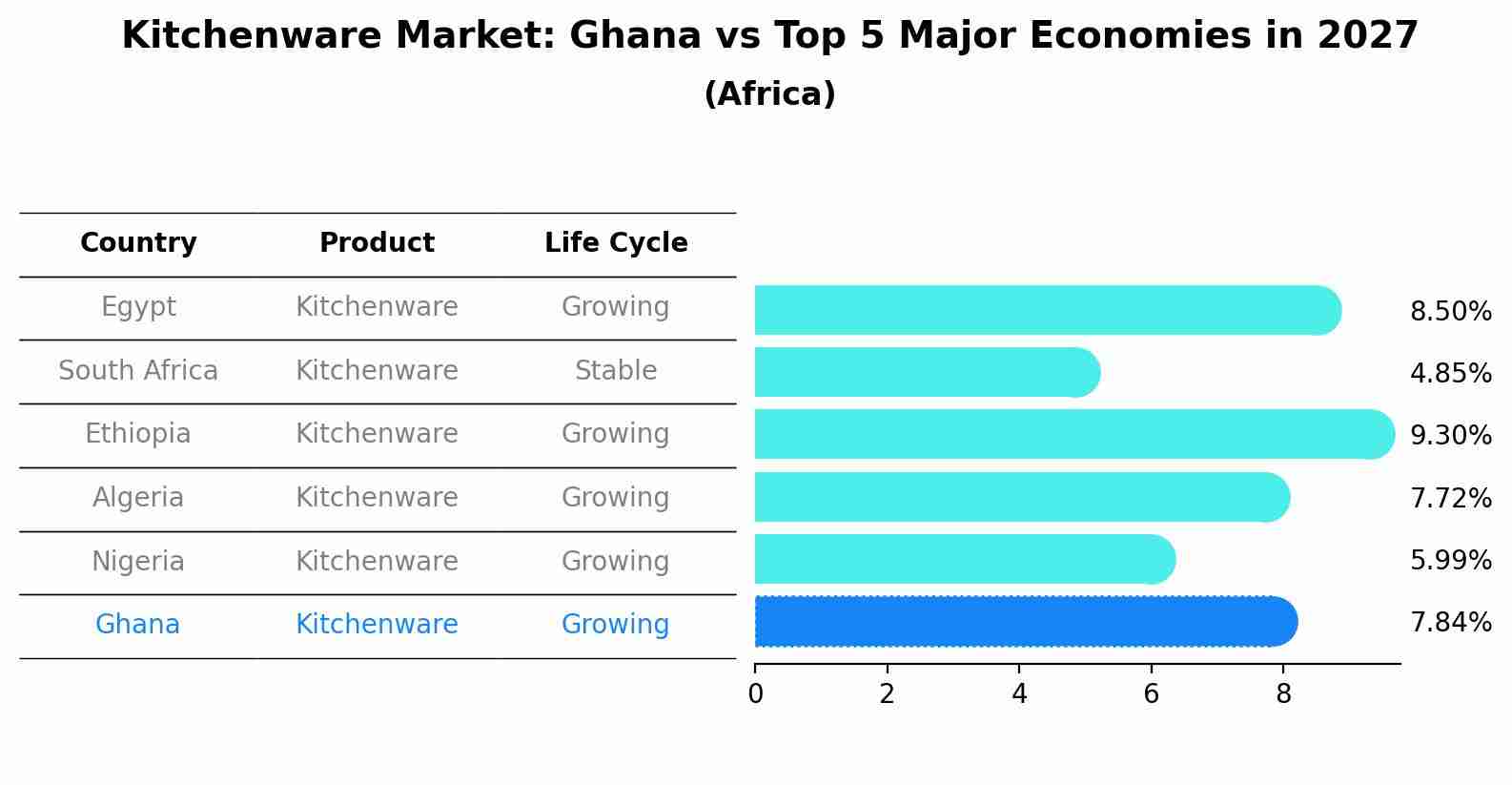Ghana Kitchenware Market (2025-2031) Outlook | Trends, Analysis, Forecast, Value, Revenue, Growth, Size, Industry, Share, Companies
| Product Code: ETC377096 | Publication Date: Aug 2022 | Updated Date: Jul 2025 | Product Type: Market Research Report | |
| Publisher: 6Wresearch | Author: Vasudha | No. of Pages: 75 | No. of Figures: 35 | No. of Tables: 20 |
Ghana Kitchenware Market Size Growth Rate
The Ghana Kitchenware Market is likely to experience consistent growth rate gains over the period 2025 to 2029. Commencing at 6.81% in 2025, growth builds up to 13.86% by 2029.

Kitchenware Market: Ghana vs Top 5 Major Economies in 2027 (Africa)
By 2027, Ghana's Kitchenware market is forecasted to achieve a growing growth rate of 7.84%, with Egypt leading the Africa region, followed by South Africa, Ethiopia, Algeria and Nigeria.

Ghana Kitchenware Market Synopsis
The kitchenware market in Ghana is experiencing steady growth driven by increasing urbanization, rising disposable incomes, and changing consumer lifestyles. Ghanaian consumers are increasingly looking for modern and efficient kitchen tools and appliances to make their cooking experiences more convenient. The market offers a wide variety of products including cookware, bakeware, utensils, small kitchen appliances, and food storage containers. International brands are gaining popularity due to their quality and innovation, although local manufacturers also play a significant role in meeting the demand for kitchenware products. E-commerce platforms are becoming a popular channel for purchasing kitchenware, providing consumers with easy access to a wider range of products. Overall, the Ghana kitchenware market presents opportunities for both local and international companies to cater to the evolving needs of consumers in the country.
Ghana Kitchenware Market Trends
The Ghana Kitchenware Market is experiencing a shift towards more sustainable and eco-friendly products due to growing awareness of environmental issues. Consumers are increasingly seeking kitchenware made from natural materials such as bamboo, wood, and stainless steel, which are considered to be more durable and environmentally friendly alternatives to traditional plastic products. Additionally, there is a rising demand for multi-functional and space-saving kitchenware items to accommodate smaller living spaces in urban areas. Online sales of kitchenware products are also on the rise, driven by the convenience and variety offered by e-commerce platforms. Overall, the market is seeing a trend towards products that prioritize sustainability, functionality, and convenience in response to changing consumer preferences.
Ghana Kitchenware Market Challenges
In the Ghana kitchenware market, some key challenges include limited access to high-quality materials and products, resulting in a reliance on imported goods that can be expensive. This poses a barrier for local manufacturers and retailers in terms of competitiveness and pricing. Additionally, inconsistent supply chain infrastructure and distribution networks can lead to delays and inefficiencies in getting products to consumers. Cultural preferences and traditional cooking methods also play a role in shaping consumer demand, making it essential for businesses to understand and cater to these preferences. Lastly, the presence of counterfeit products in the market poses a challenge for both consumers and legitimate businesses, impacting brand reputation and consumer trust. Overall, navigating these challenges requires strategic planning, investment in quality control, and a deep understanding of the local market dynamics.
Ghana Kitchenware Market Investment Opportunities
The Ghana kitchenware market presents promising investment opportunities due to the country`s growing middle class, increasing urbanization, and evolving consumer preferences towards modern and convenient kitchen products. Investors can explore opportunities in supplying high-quality and innovative kitchenware products such as cookware, utensils, appliances, and storage solutions to meet the rising demand in the market. Additionally, there is potential for partnerships with local distributors and retailers to penetrate the market more effectively. With a focus on quality, affordability, and understanding the local consumer needs, investors can capitalize on the expanding kitchenware sector in Ghana and establish a strong presence in this growing market.
Jordan Agar Market Government Policies
Government policies related to the Ghana Kitchenware Market primarily focus on promoting local manufacturing and entrepreneurship while also regulating imports to support domestic production. The government has implemented measures such as import tariffs and quality standards to protect local manufacturers and ensure consumer safety. Additionally, initiatives such as tax incentives and business support programs aim to encourage the growth of small and medium-sized enterprises in the kitchenware industry. Overall, the government`s policies work towards creating a conducive environment for local production, innovation, and competitiveness in the Ghana Kitchenware Market.
Ghana Kitchenware Market Future Outlook
The Ghana Kitchenware Market is expected to experience steady growth in the coming years due to increasing urbanization, rising disposable incomes, and a growing interest in cooking and culinary activities among the population. The market is likely to be driven by the demand for modern and innovative kitchen gadgets and appliances, as well as a shift towards more convenient and efficient cooking solutions. Additionally, the growing trend of home cooking and entertaining, especially in the wake of the COVID-19 pandemic, is expected to further boost the demand for kitchenware products in Ghana. However, challenges such as price sensitivity, competition from unorganized sector, and limited awareness about advanced kitchenware products may impact the market growth to some extent. Overall, the future outlook for the Ghana Kitchenware Market remains positive with opportunities for growth and innovation.
Key Highlights of the Report:
- Ghana Kitchenware Market Outlook
- Market Size of Ghana Kitchenware Market, 2024
- Forecast of Ghana Kitchenware Market, 2031
- Historical Data and Forecast of Ghana Kitchenware Revenues & Volume for the Period 2021 - 2031
- Ghana Kitchenware Market Trend Evolution
- Ghana Kitchenware Market Drivers and Challenges
- Ghana Kitchenware Price Trends
- Ghana Kitchenware Porter's Five Forces
- Ghana Kitchenware Industry Life Cycle
- Historical Data and Forecast of Ghana Kitchenware Market Revenues & Volume By Product Type for the Period 2021 - 2031
- Historical Data and Forecast of Ghana Kitchenware Market Revenues & Volume By Cookware for the Period 2021 - 2031
- Historical Data and Forecast of Ghana Kitchenware Market Revenues & Volume By Bakeware for the Period 2021 - 2031
- Historical Data and Forecast of Ghana Kitchenware Market Revenues & Volume By Others for the Period 2021 - 2031
- Historical Data and Forecast of Ghana Kitchenware Market Revenues & Volume By End User for the Period 2021 - 2031
- Historical Data and Forecast of Ghana Kitchenware Market Revenues & Volume By Residential Kitchen for the Period 2021 - 2031
- Historical Data and Forecast of Ghana Kitchenware Market Revenues & Volume By Commercial Kitchens for the Period 2021 - 2031
- Historical Data and Forecast of Ghana Kitchenware Market Revenues & Volume By Sales Channel for the Period 2021 - 2031
- Historical Data and Forecast of Ghana Kitchenware Market Revenues & Volume By Online for the Period 2021 - 2031
- Historical Data and Forecast of Ghana Kitchenware Market Revenues & Volume By Offline for the Period 2021 - 2031
- Ghana Kitchenware Import Export Trade Statistics
- Market Opportunity Assessment By Product Type
- Market Opportunity Assessment By End User
- Market Opportunity Assessment By Sales Channel
- Ghana Kitchenware Top Companies Market Share
- Ghana Kitchenware Competitive Benchmarking By Technical and Operational Parameters
- Ghana Kitchenware Company Profiles
- Ghana Kitchenware Key Strategic Recommendations
Frequently Asked Questions About the Market Study (FAQs):
Export potential assessment - trade Analytics for 2030
Export potential enables firms to identify high-growth global markets with greater confidence by combining advanced trade intelligence with a structured quantitative methodology. The framework analyzes emerging demand trends and country-level import patterns while integrating macroeconomic and trade datasets such as GDP and population forecasts, bilateral import–export flows, tariff structures, elasticity differentials between developed and developing economies, geographic distance, and import demand projections. Using weighted trade values from 2020–2024 as the base period to project country-to-country export potential for 2030, these inputs are operationalized through calculated drivers such as gravity model parameters, tariff impact factors, and projected GDP per-capita growth. Through an analysis of hidden potentials, demand hotspots, and market conditions that are most favorable to success, this method enables firms to focus on target countries, maximize returns, and global expansion with data, backed by accuracy.
By factoring in the projected importer demand gap that is currently unmet and could be potential opportunity, it identifies the potential for the Exporter (Country) among 190 countries, against the general trade analysis, which identifies the biggest importer or exporter.
To discover high-growth global markets and optimize your business strategy:
Click Here- Single User License$ 1,995
- Department License$ 2,400
- Site License$ 3,120
- Global License$ 3,795
Search
Thought Leadership and Analyst Meet
Our Clients
Related Reports
- India Switchgear Market Outlook (2026 - 2032) | Size, Share, Trends, Growth, Revenue, Forecast, Analysis, Value, Outlook
- Pakistan Contraceptive Implants Market (2025-2031) | Demand, Growth, Size, Share, Industry, Pricing Analysis, Competitive, Strategic Insights, Strategy, Consumer Insights, Analysis, Investment Trends, Opportunities, Revenue, Segments, Value, Segmentation, Supply, Forecast, Restraints, Outlook, Competition, Drivers, Trends, Companies, Challenges
- Sri Lanka Packaging Market (2026-2032) | Outlook, Competition, Drivers, Trends, Demand, Pricing Analysis, Competitive, Strategic Insights, Companies, Challenges, Strategy, Consumer Insights, Analysis, Investment Trends, Opportunities, Growth, Size, Share, Industry, Revenue, Segments, Value, Segmentation, Supply, Forecast, Restraints
- India Kids Watches Market (2026-2032) | Strategy, Consumer Insights, Analysis, Investment Trends, Opportunities, Growth, Size, Share, Industry, Revenue, Segments, Value, Segmentation, Supply, Forecast, Restraints, Outlook, Competition, Drivers, Trends, Demand, Pricing Analysis, Competitive, Strategic Insights, Companies, Challenges
- Saudi Arabia Core Assurance Service Market (2025-2031) | Strategy, Consumer Insights, Analysis, Investment Trends, Opportunities, Growth, Size, Share, Industry, Revenue, Segments, Value, Segmentation, Supply, Forecast, Restraints, Outlook, Competition, Drivers, Trends, Demand, Pricing Analysis, Competitive, Strategic Insights, Companies, Challenges
- Romania Uninterruptible Power Supply (UPS) Market (2026-2032) | Industry, Analysis, Revenue, Size, Forecast, Outlook, Value, Trends, Share, Growth & Companies
- Saudi Arabia Car Window Tinting Film, Paint Protection Film (PPF), and Ceramic Coating Market (2025-2031) | Strategy, Consumer Insights, Analysis, Investment Trends, Opportunities, Growth, Size, Share, Industry, Revenue, Segments, Value, Segmentation, Supply, Forecast, Restraints, Outlook, Competition, Drivers, Trends, Demand, Pricing Analysis, Competitive, Strategic Insights, Companies, Challenges
- South Africa Stationery Market (2025-2031) | Share, Size, Industry, Value, Growth, Revenue, Analysis, Trends, Segmentation & Outlook
- Afghanistan Rocking Chairs And Adirondack Chairs Market (2026-2032) | Size & Revenue, Competitive Landscape, Share, Segmentation, Industry, Value, Outlook, Analysis, Trends, Growth, Forecast, Companies
- Afghanistan Apparel Market (2026-2032) | Growth, Outlook, Industry, Segmentation, Forecast, Size, Companies, Trends, Value, Share, Analysis & Revenue
Industry Events and Analyst Meet
Whitepaper
- Middle East & Africa Commercial Security Market Click here to view more.
- Middle East & Africa Fire Safety Systems & Equipment Market Click here to view more.
- GCC Drone Market Click here to view more.
- Middle East Lighting Fixture Market Click here to view more.
- GCC Physical & Perimeter Security Market Click here to view more.
6WResearch In News
- Doha a strategic location for EV manufacturing hub: IPA Qatar
- Demand for luxury TVs surging in the GCC, says Samsung
- Empowering Growth: The Thriving Journey of Bangladesh’s Cable Industry
- Demand for luxury TVs surging in the GCC, says Samsung
- Video call with a traditional healer? Once unthinkable, it’s now common in South Africa
- Intelligent Buildings To Smooth GCC’s Path To Net Zero


















